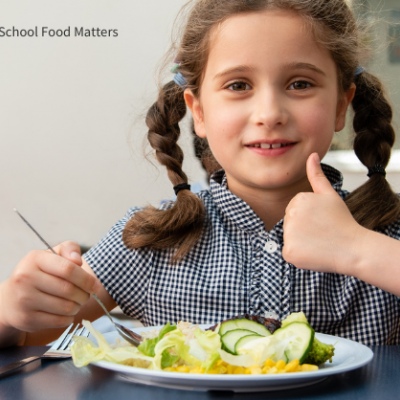Local diets have global impacts. We have developed a new guide and film to support local authorities to serve and source healthier, more sustainable meals
The science is clear: the global food system is a key driver of climate change, deforestation and catastrophic declines in biodiversity. Emissions from the food system are so large that they could, on their own, tip us over the Paris Agreement warming thresholds of 1.5° and 2°C, putting us on the path of dangerous climate change. We can’t tackle the climate, nature and public health crises without addressing food. With the challenges we face, every meal counts.
Kath Dalmeny, chief executive of the Sustain alliance, said:"Councils hold four big keys to reducing the huge impact of our food system on our climate, wildlife and people’s health. These are the food that councils buy, the land they manage, how they deal with food waste and how they support local food businesses. This is a fantastic how-to guide and we're looking forward to it becoming a core part of our work with local food partnerships across the UK through the new Food for the Planet campaign."
David E Edwards, director of food strategy at WWF-UK said: “In the lead up to the COP26 climate summit, many local authorities are taking action by declaring a climate emergency, but often these have no plans to deal with food-related emissions. Our Living Planet report reveals the steep decline in nature and biodiversity, primarily driven by our food system. Local authorities have a key role in addressing this by procuring and serving healthy and sustainable food, supported by UK government coming forward with an ambitious Food White Paper in the new year. This guide will help local authorities play their part in tackling the climate and nature crises.”
Local action can make a world of difference
The public sector serves an estimated one billion meals in schools every year. Reducing meat and dairy consumption will help reduce the greenhouse gas emissions’ footprint of our diet. Healthier diets with less meat and dairy and more vegetables and legumes have lower environmental impacts: if everyone in the UK adopted a diet in line with the Eatwell Guide, it is estimated dietary emissions would fall by 45%, water use by 4% and land use by 49%. Local areas are ideally placed to deliver this change. The expertise they have about their populations is a huge asset that policy makers can access when designing and planning for the most sustainable food provision within their public contracts.
.png)
Anna Taylor OBE, executive director at The Food Foundation said: “Public procurement offers a huge opportunity to help us tackle obesity and meet our climate targets by improving the health and sustainability of our diets. Local authorities serve millions of children and adults every day, and Eating Better’s guide offers a useful practical toolkit for local authorities who want to change their sourcing for the better. To drive up minimum standards in public procurement across the piece, Government now needs to support local authorities with the right standards and laws.”
Stephanie Slater, CEO and founder at School Food Matters said: “If we are committed to taking steps on climate change, tackling food procurement is the way to go. If you set up an ambition for contract caterers, or whoever is bidding, to do the best for children rather than the cheapest, great things happen. And with that, meal numbers go up, more children are eating great food and the economies of scale means that it is financially viable as well.”
What to do: Serve more vegetables and pulses, less and better meat and dairy
‘Serving Better’ shows how local areas and public sector organisations can take bold and urgent action to shift to serving more sustainable food, with less meat of all types, less dairy and more plant proteins and vegetables. With a focus on the role of meat and dairy, the ‘Serving Better’ guide inspires and encourages local authorities to commit to deliver:
- 25% reduction in the volume of meat and dairy served in council-controlled settings by 2025
- 25% of meat and dairy served meets ‘better’ animal welfare and environmental standards by 2025
Finding a way forward, together
Serving Better: a guide for local authorities is the outcome of a collaboration of leading UK NGOs working on food across the public sector: Eating Better, Sustain, the Sustainable Food Trust, WWF UK, Friends of the Earth and FOUR PAWS UK. It draws on the expertise of our alliance of 60+ civil society organisations working on sustainable, healthy and fair food and farming.
We collectively recognise the critical role of the public sector in normalising sustainable diets through public procurement of food. We are working together to show that serving sustainable healthy food is achievable, and it doesn’t have to cost more. It’s all about finding ways to put more vegetables, beans and pulses in meals and showing leadership.
Clare Oxborrow, senior sustainability analyst at Friends of the Earth said: “We cannot address the climate and nature crises without addressing the impacts of our food. Local authorities serve around one billion school meals a year so they have the power to make a huge impact through simple changes to their menus. This timely guide shows how local councils can play their part by serving ‘less and better’ meat and dairy, and more plant proteins. It will also equip local activists to work with their councils on taking forward this critical agenda as part of their climate campaigns.”
